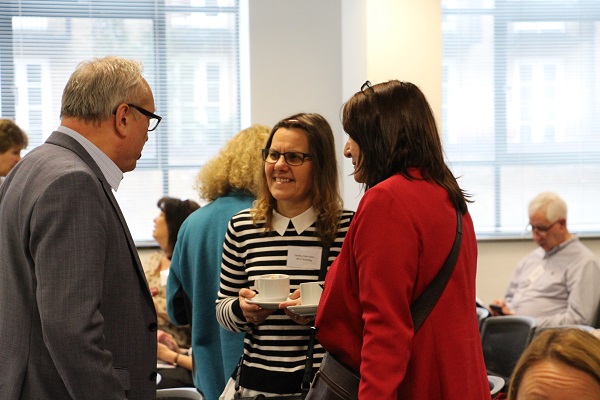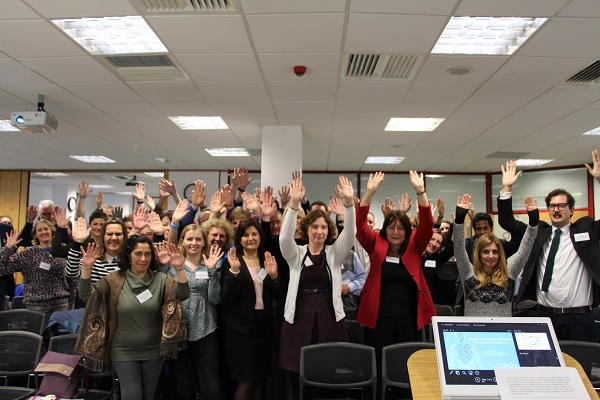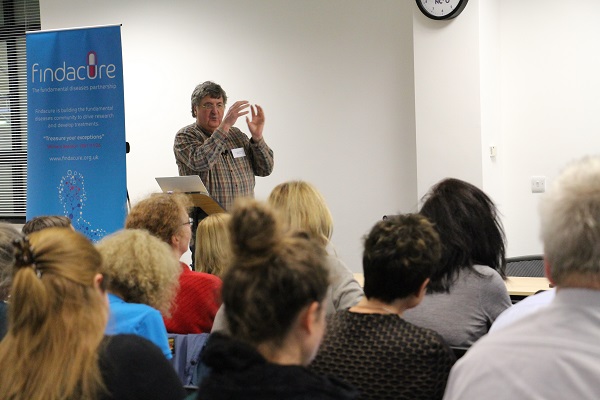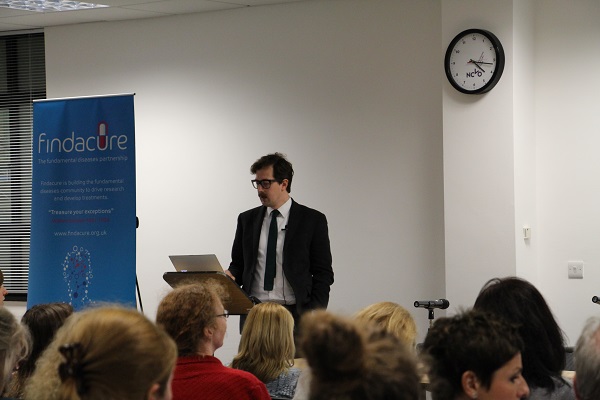Last week the AKU team attended a workshop run by Findacure called ‘Navigating the Highly Specialised Technology Programme’ to improve access to rare disease treatments. This week’s blog talks about the many important messages that were taken from the day.
The AKU Society is very aware of the challenges rare disease patients’ face with accessing appropriate treatment. Welsh AKU patients attending the National AKU Centre (NAC) do not have access to off-license nitisinone, while English and Scottish patients do. The society is currently running a 4-year clinical trial, DevelopAKUre, to measure the effectiveness of nitisinone in treating AKU.
Findacure’s workshop was really valuable in bringing together healthcare professionals, patients and patient representatives to raise awareness and provide information on the funding process for highly specialised technologies.

The event started with an introduction from Flora Raffai, chief executive of Findacure. Flora discussed the many challenges surrounding development and access to rare disease treatment. There are over 7,000 known rare diseases affecting 350 million people worldwide, yet there are currently only 400 licensed treatments. It was refreshing to hear from an organisation passionate about tackling this issue head on!

The day’s first speakers were from National Institute for Health and Care Excellence (NICE). NICE aims to ensure that everyone has access to the same treatment, avoiding the postcode lottery system that was far too prevalent before. By employing evidence based guidance, NICE advises on whether new medication should be funded by assessing whether it is quality and value for money.
There are many difficulties NICE face when evaluating rare disease drugs. Small populations, small trials and lack of long-term data, means that they don’t usually appear cost-effective. The highly specialised technology programme (HST) allows rare disease technologies to be assessed based on different parameters, ensuring that new and innovative rare disease therapies are bought to market. A variety of different factors are assessed including societal value, seriousness of condition, availability of alternative treatments and cost to the patient if the drug is rejected.
The HST process involves an evaluation committee, where a variety of different healthcare professionals and lay members consider all relevant evidence. The next speaker, Professor Ron Alehurst, discussed his role as a member of the committee and the importance of patient input.
The next speaker was Len Woodward from aHUS UK. He gave a vital patient group perspective on the NICE evaluation process. aHUS UK formed to give the patient voice during the evaluation of eculizumab, a high cost medication estimated at £10million per patient (lifetime of the patient). Despite the high cost, the medication really changed patients’ lives. aHUS was very influential in the decision to fund eculizumab, interviewing patients and creating a patient experience report was an important part of the process.

The final speaker of the day was Nick Meade from Genetic Alliance, an organisation with 180 patient group members that aims to increase the profile of genetic conditions. Keen to get the patient perspective on HST processes, Genetic Alliance invited 16 patient organisations to a workshop. Feedback from patients was then consolidated and used to develop a patient charter, where 29 recommendations were made. The AKU Society were pleased to contribute to developing this charter that will be used to advise policy makers!

We ended the day with a panel discussion, where all speakers were invited to contribute to some challenging debates, including how to support the patient voice without an organisation and how to make rare disease drugs more accessible.
The whole event was fantastic in raising awareness of the HST programme, stressing the importance of patient input and encouraging discussions about improving access to specialised services. With Rare Disease Day coming up, it is the perfect time to raise awareness of specialised treatment access by contacting your local MP and attending one of Genetic Alliances’ parliamentary receptions!
